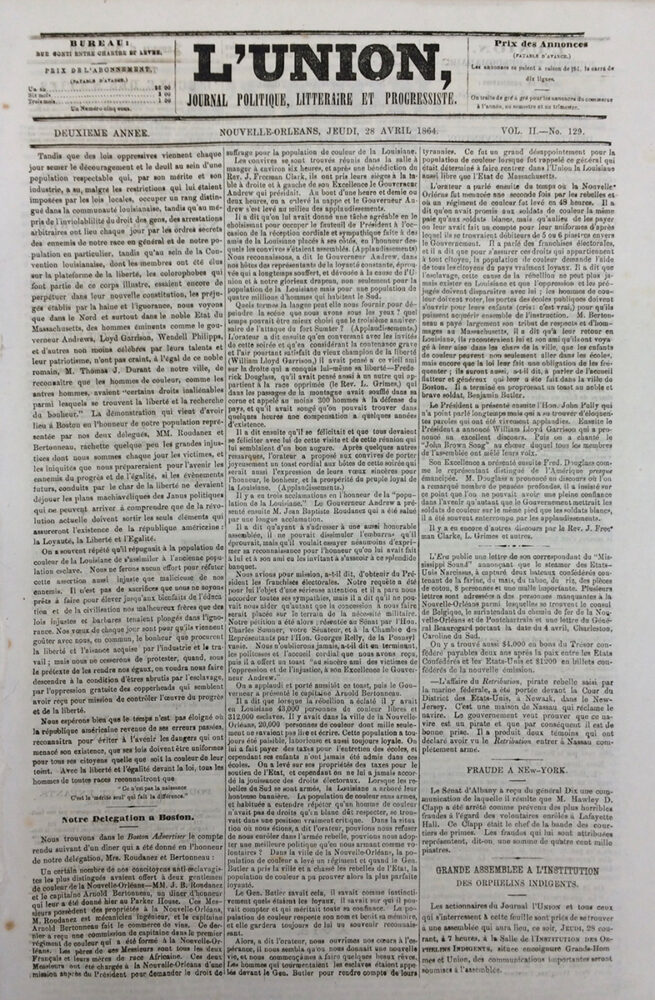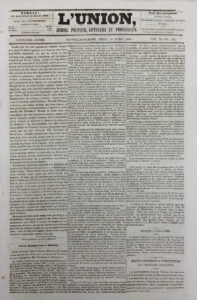Paul Trévigne
Paul Trévigne, a free man of color, was an editor, teacher, and orator who advocated for civil rights in the nineteenth and early twentieth centuries.

Roudanez History & Legacy
Paul Trévigne was the editor of L’Union, the South’s first Black newspaper, April 28, 1864.
Paul Trévigne was an educator, author, journalist, and civil rights leader. He is best known as the editor of L’Union, the South’s first Black newspaper, and the New Orleans Tribune, America’s first Black daily newspaper. Trévigne also worked for two other Black newspapers, the Louisianan and the Crusader.
Trévigne was born in New Orleans in 1824 to Josephine Decoudreaux and Francis Paul
Trévigne, both free persons of color. Trévigne was well educated and multilingual. He married educator Hortensia Léon in 1858 and resided on Columbus Street. According to Rodolphe Lucien Desdunes, Trévigne was known for his “concise yet easy going style” and the “playful manner with which he communicated his ideas.”
For many decades Trévigne was a teacher and administrator at the Catholic School for Indigent Orphans, also known as the Couvent School, an institution that educated children of African descent who would otherwise be denied instruction. Many graduates would go on to distinguish themselves as civil rights activists.
In 1862 Trévigne collaborated with Louis Charles Roudanez and Jean Baptiste Roudanez to publish L’Union. As chief editor Trévigne wrote many commentaries that inspired a new Black freedom movement in New Orleans. “The triumph of the enemies of the Union … would have a certain result,” he declared in an 1863 editorial. “The slave would see his shackles tightened, the white worker would be dragged through the mud, and the free man of color would only stumble with handcuffs on his wrists and a gag in his mouth. Without protest and without acting, we would so remain!!”
Trévigne was a fiery orator, often speaking at mass meetings. “If we refer to history, and consider the course of things in times of revolution, we see that men of progress have always been victims to tyranny,” he exclaimed at a large voting rights rally held at Economy Hall in 1865. “But we will not be recreant to our duty; tyranny will only elevate us higher … let the world echo with the sound of your cheering.”
Trévigne was a Free Mason who helped initiate racially integrated lodges in the 1860s. He fought for integrated public schools in New Orleans in the late 1870s, challenging the Orleans Parish School Board’s segregation of the public schools.
In the 1870s Trévigne wrote for the Black-owned newspaper the Louisianan. His treatise, “A Centennial History of the Louisiana Negro,” appeared in the journal, spotlighting the many achievements of Black Louisianans. He later helped found another Black newspaper, the Crusader (1889–1898), working as a translator and editor. The Crusader, in the tradition of the earlier New Orleans Tribune, helped spark a civil rights movement that coalesced around the journal’s call for integration. During the Crusader era, Trévigne was instrumental in the creation of the American Citizens’ Equal Rights Association, a national organization formed just before the Louisiana legislature passed the Separate Car Act mandating “equal but separate” passenger cars. He played an important role in the establishment of the Citizen’s Committee, an organization that launched Homer Plessy’s challenge to segregation law. He died in 1907.
